Professional IT Practice and Ethics Essay - BIT241
VerifiedAdded on 2022/10/15
|7
|1566
|7
Essay
AI Summary
This essay delves into the ethical considerations within the Information and Communication Technology (ICT) industry. It examines key ethical theories, including rights versus virtue ethics, relativism versus objectivism, and consequentialism versus deontology, and their implications in the context of ICT practices. The essay provides a detailed comparison and contrast of these theories, illustrating their relevance to real-world scenarios within the industry. Furthermore, it analyzes professional ethical codes, such as those from ACS, ACM, and IEEE, highlighting how these codes align with and are influenced by the aforementioned ethical theories. The paper concludes by emphasizing the importance of ethical frameworks in guiding responsible behavior and decision-making in the rapidly evolving field of ICT, ensuring the protection of computer systems and addressing new challenges posed by technological advancements.
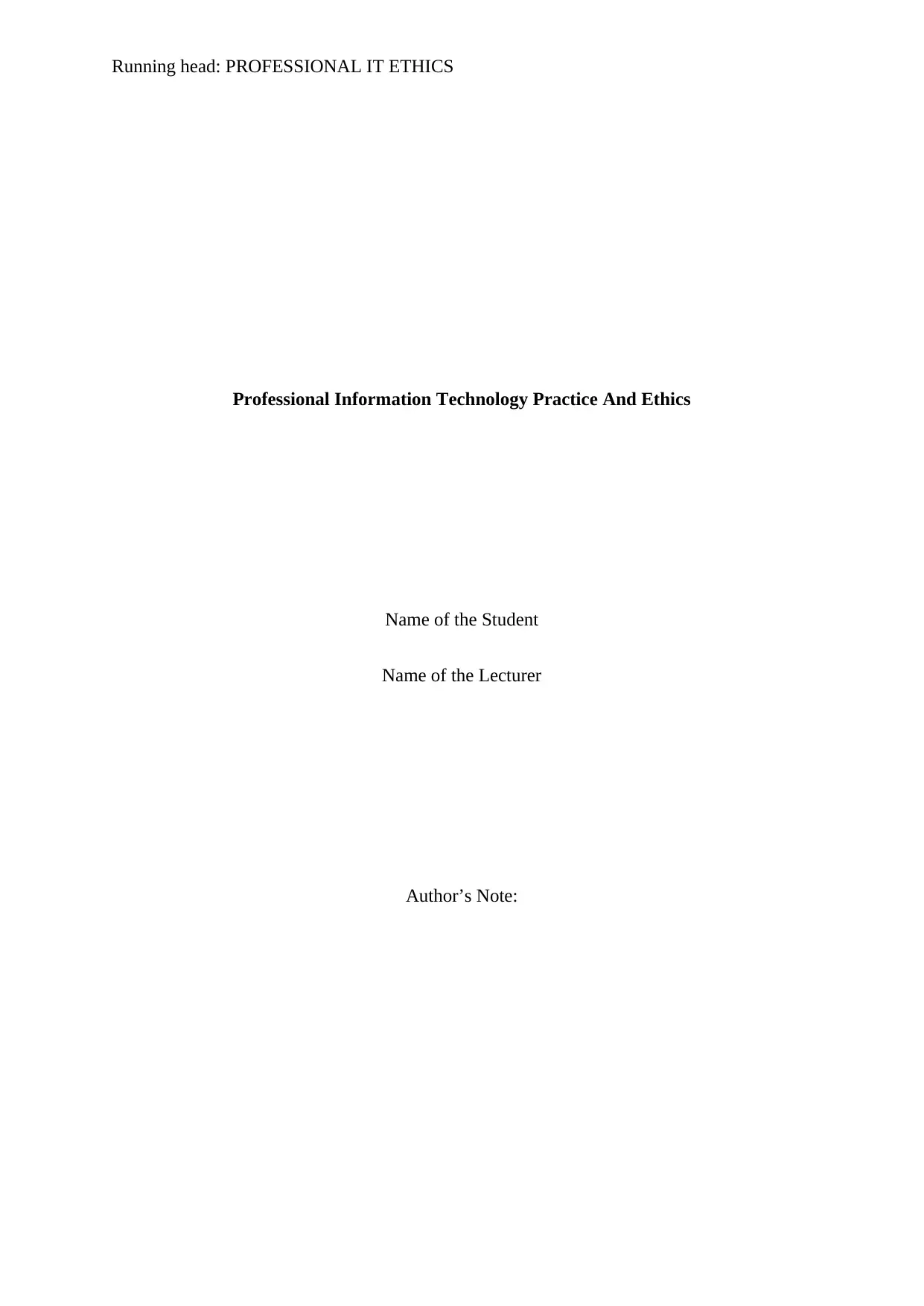
Running head: PROFESSIONAL IT ETHICS
Professional Information Technology Practice And Ethics
Name of the Student
Name of the Lecturer
Author’s Note:
Professional Information Technology Practice And Ethics
Name of the Student
Name of the Lecturer
Author’s Note:
Paraphrase This Document
Need a fresh take? Get an instant paraphrase of this document with our AI Paraphraser
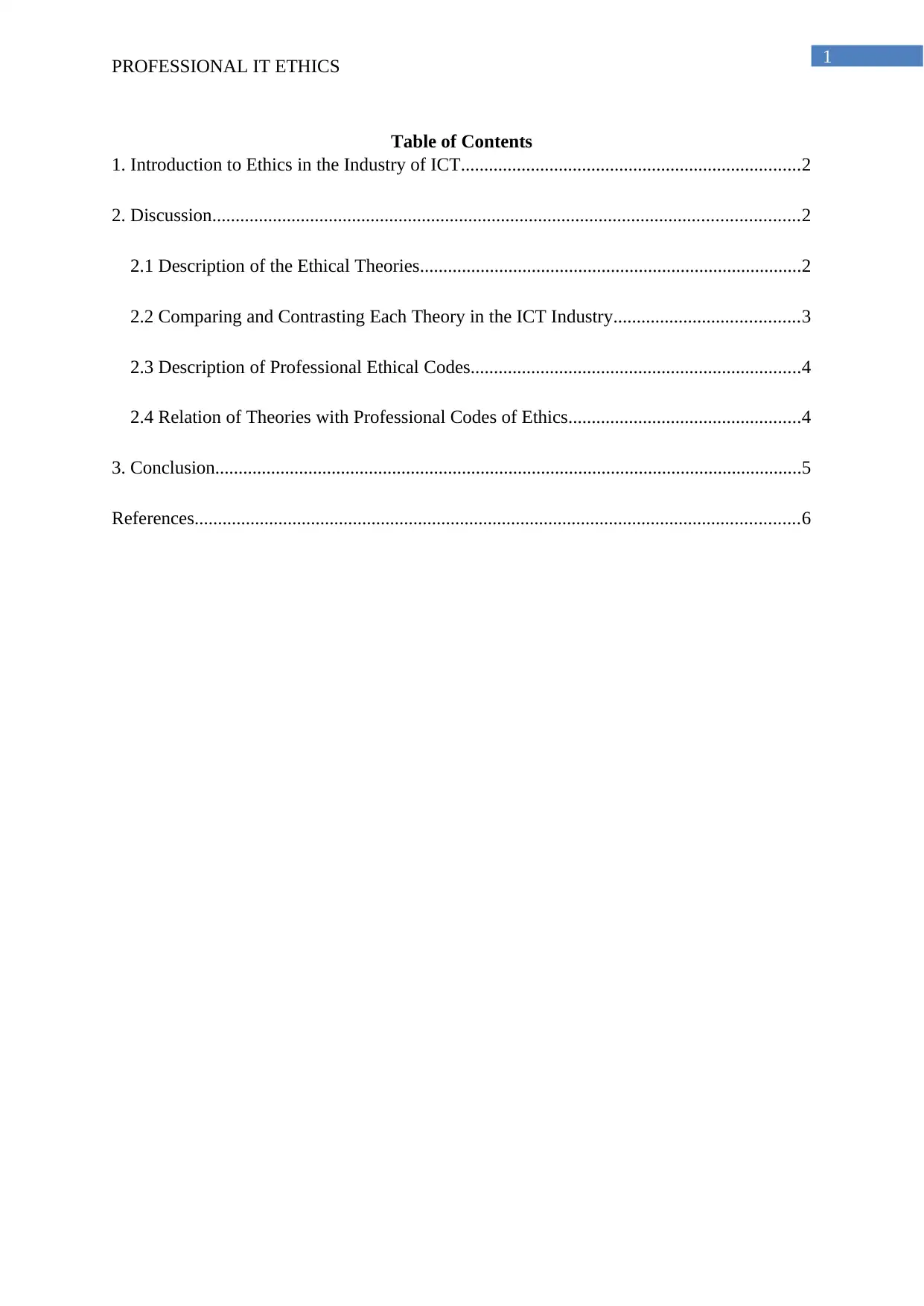
1
PROFESSIONAL IT ETHICS
Table of Contents
1. Introduction to Ethics in the Industry of ICT.........................................................................2
2. Discussion..............................................................................................................................2
2.1 Description of the Ethical Theories..................................................................................2
2.2 Comparing and Contrasting Each Theory in the ICT Industry........................................3
2.3 Description of Professional Ethical Codes.......................................................................4
2.4 Relation of Theories with Professional Codes of Ethics..................................................4
3. Conclusion..............................................................................................................................5
References..................................................................................................................................6
PROFESSIONAL IT ETHICS
Table of Contents
1. Introduction to Ethics in the Industry of ICT.........................................................................2
2. Discussion..............................................................................................................................2
2.1 Description of the Ethical Theories..................................................................................2
2.2 Comparing and Contrasting Each Theory in the ICT Industry........................................3
2.3 Description of Professional Ethical Codes.......................................................................4
2.4 Relation of Theories with Professional Codes of Ethics..................................................4
3. Conclusion..............................................................................................................................5
References..................................................................................................................................6
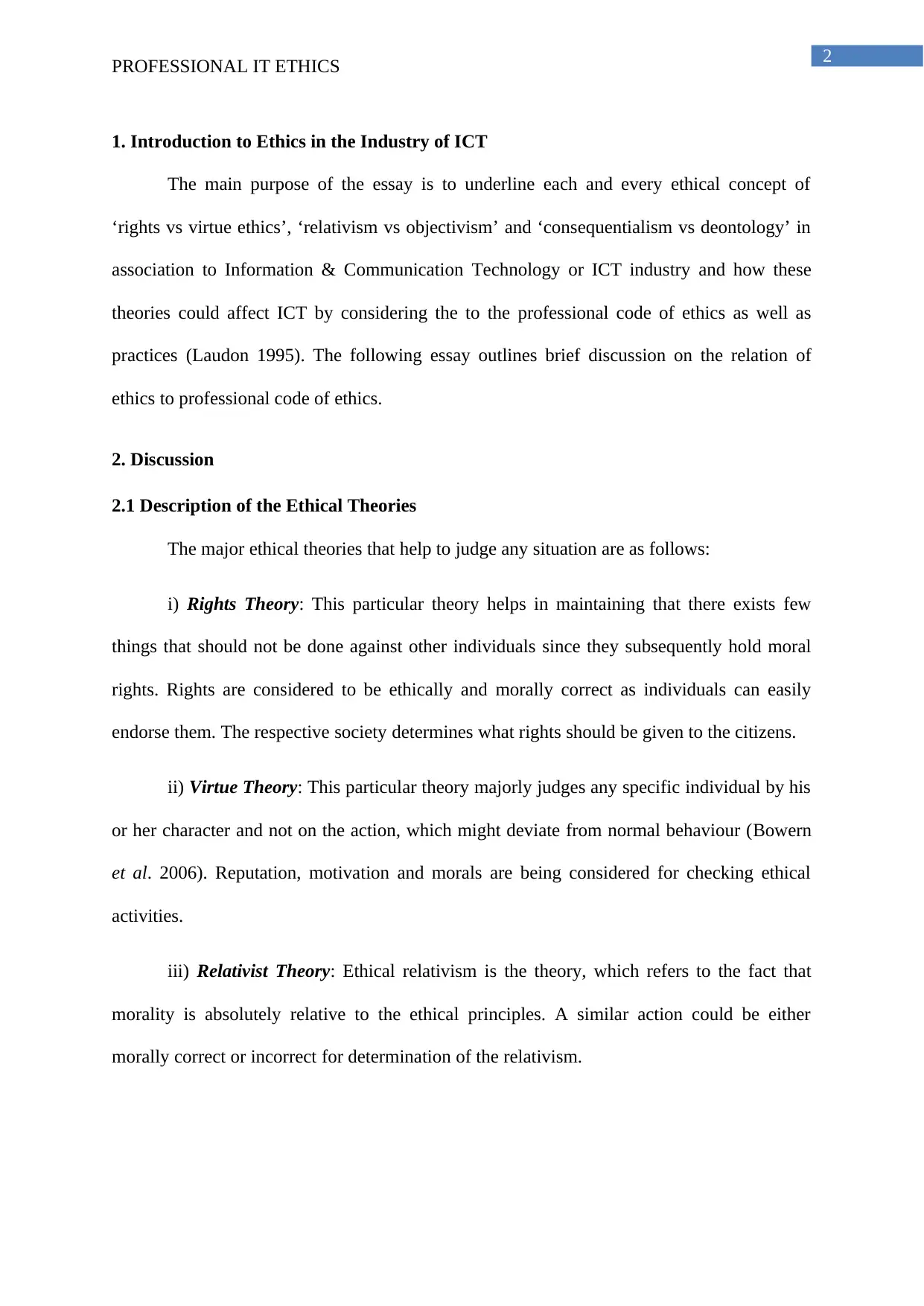
2
PROFESSIONAL IT ETHICS
1. Introduction to Ethics in the Industry of ICT
The main purpose of the essay is to underline each and every ethical concept of
‘rights vs virtue ethics’, ‘relativism vs objectivism’ and ‘consequentialism vs deontology’ in
association to Information & Communication Technology or ICT industry and how these
theories could affect ICT by considering the to the professional code of ethics as well as
practices (Laudon 1995). The following essay outlines brief discussion on the relation of
ethics to professional code of ethics.
2. Discussion
2.1 Description of the Ethical Theories
The major ethical theories that help to judge any situation are as follows:
i) Rights Theory: This particular theory helps in maintaining that there exists few
things that should not be done against other individuals since they subsequently hold moral
rights. Rights are considered to be ethically and morally correct as individuals can easily
endorse them. The respective society determines what rights should be given to the citizens.
ii) Virtue Theory: This particular theory majorly judges any specific individual by his
or her character and not on the action, which might deviate from normal behaviour (Bowern
et al. 2006). Reputation, motivation and morals are being considered for checking ethical
activities.
iii) Relativist Theory: Ethical relativism is the theory, which refers to the fact that
morality is absolutely relative to the ethical principles. A similar action could be either
morally correct or incorrect for determination of the relativism.
PROFESSIONAL IT ETHICS
1. Introduction to Ethics in the Industry of ICT
The main purpose of the essay is to underline each and every ethical concept of
‘rights vs virtue ethics’, ‘relativism vs objectivism’ and ‘consequentialism vs deontology’ in
association to Information & Communication Technology or ICT industry and how these
theories could affect ICT by considering the to the professional code of ethics as well as
practices (Laudon 1995). The following essay outlines brief discussion on the relation of
ethics to professional code of ethics.
2. Discussion
2.1 Description of the Ethical Theories
The major ethical theories that help to judge any situation are as follows:
i) Rights Theory: This particular theory helps in maintaining that there exists few
things that should not be done against other individuals since they subsequently hold moral
rights. Rights are considered to be ethically and morally correct as individuals can easily
endorse them. The respective society determines what rights should be given to the citizens.
ii) Virtue Theory: This particular theory majorly judges any specific individual by his
or her character and not on the action, which might deviate from normal behaviour (Bowern
et al. 2006). Reputation, motivation and morals are being considered for checking ethical
activities.
iii) Relativist Theory: Ethical relativism is the theory, which refers to the fact that
morality is absolutely relative to the ethical principles. A similar action could be either
morally correct or incorrect for determination of the relativism.
⊘ This is a preview!⊘
Do you want full access?
Subscribe today to unlock all pages.

Trusted by 1+ million students worldwide
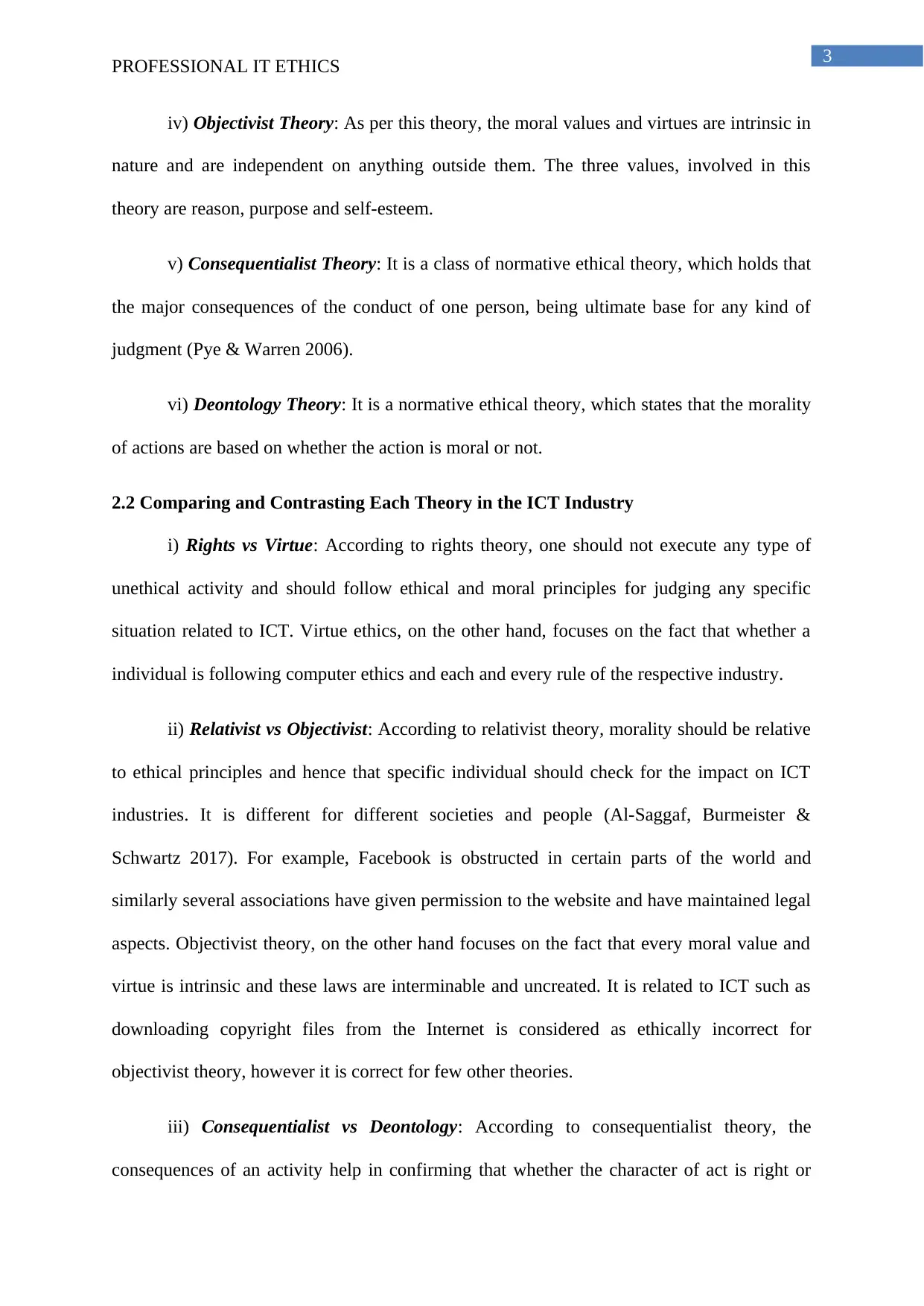
3
PROFESSIONAL IT ETHICS
iv) Objectivist Theory: As per this theory, the moral values and virtues are intrinsic in
nature and are independent on anything outside them. The three values, involved in this
theory are reason, purpose and self-esteem.
v) Consequentialist Theory: It is a class of normative ethical theory, which holds that
the major consequences of the conduct of one person, being ultimate base for any kind of
judgment (Pye & Warren 2006).
vi) Deontology Theory: It is a normative ethical theory, which states that the morality
of actions are based on whether the action is moral or not.
2.2 Comparing and Contrasting Each Theory in the ICT Industry
i) Rights vs Virtue: According to rights theory, one should not execute any type of
unethical activity and should follow ethical and moral principles for judging any specific
situation related to ICT. Virtue ethics, on the other hand, focuses on the fact that whether a
individual is following computer ethics and each and every rule of the respective industry.
ii) Relativist vs Objectivist: According to relativist theory, morality should be relative
to ethical principles and hence that specific individual should check for the impact on ICT
industries. It is different for different societies and people (Al-Saggaf, Burmeister &
Schwartz 2017). For example, Facebook is obstructed in certain parts of the world and
similarly several associations have given permission to the website and have maintained legal
aspects. Objectivist theory, on the other hand focuses on the fact that every moral value and
virtue is intrinsic and these laws are interminable and uncreated. It is related to ICT such as
downloading copyright files from the Internet is considered as ethically incorrect for
objectivist theory, however it is correct for few other theories.
iii) Consequentialist vs Deontology: According to consequentialist theory, the
consequences of an activity help in confirming that whether the character of act is right or
PROFESSIONAL IT ETHICS
iv) Objectivist Theory: As per this theory, the moral values and virtues are intrinsic in
nature and are independent on anything outside them. The three values, involved in this
theory are reason, purpose and self-esteem.
v) Consequentialist Theory: It is a class of normative ethical theory, which holds that
the major consequences of the conduct of one person, being ultimate base for any kind of
judgment (Pye & Warren 2006).
vi) Deontology Theory: It is a normative ethical theory, which states that the morality
of actions are based on whether the action is moral or not.
2.2 Comparing and Contrasting Each Theory in the ICT Industry
i) Rights vs Virtue: According to rights theory, one should not execute any type of
unethical activity and should follow ethical and moral principles for judging any specific
situation related to ICT. Virtue ethics, on the other hand, focuses on the fact that whether a
individual is following computer ethics and each and every rule of the respective industry.
ii) Relativist vs Objectivist: According to relativist theory, morality should be relative
to ethical principles and hence that specific individual should check for the impact on ICT
industries. It is different for different societies and people (Al-Saggaf, Burmeister &
Schwartz 2017). For example, Facebook is obstructed in certain parts of the world and
similarly several associations have given permission to the website and have maintained legal
aspects. Objectivist theory, on the other hand focuses on the fact that every moral value and
virtue is intrinsic and these laws are interminable and uncreated. It is related to ICT such as
downloading copyright files from the Internet is considered as ethically incorrect for
objectivist theory, however it is correct for few other theories.
iii) Consequentialist vs Deontology: According to consequentialist theory, the
consequences of an activity help in confirming that whether the character of act is right or
Paraphrase This Document
Need a fresh take? Get an instant paraphrase of this document with our AI Paraphraser
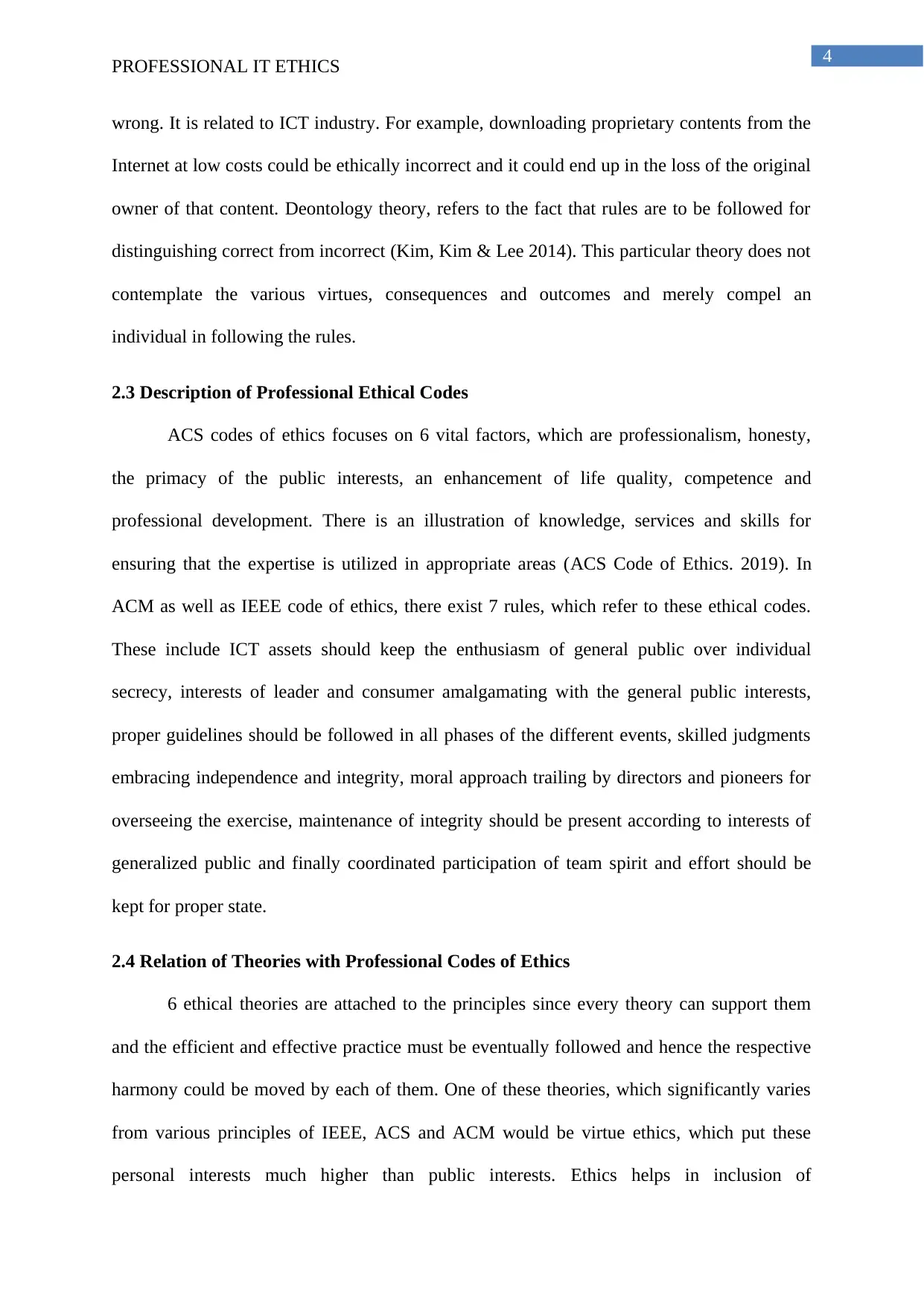
4
PROFESSIONAL IT ETHICS
wrong. It is related to ICT industry. For example, downloading proprietary contents from the
Internet at low costs could be ethically incorrect and it could end up in the loss of the original
owner of that content. Deontology theory, refers to the fact that rules are to be followed for
distinguishing correct from incorrect (Kim, Kim & Lee 2014). This particular theory does not
contemplate the various virtues, consequences and outcomes and merely compel an
individual in following the rules.
2.3 Description of Professional Ethical Codes
ACS codes of ethics focuses on 6 vital factors, which are professionalism, honesty,
the primacy of the public interests, an enhancement of life quality, competence and
professional development. There is an illustration of knowledge, services and skills for
ensuring that the expertise is utilized in appropriate areas (ACS Code of Ethics. 2019). In
ACM as well as IEEE code of ethics, there exist 7 rules, which refer to these ethical codes.
These include ICT assets should keep the enthusiasm of general public over individual
secrecy, interests of leader and consumer amalgamating with the general public interests,
proper guidelines should be followed in all phases of the different events, skilled judgments
embracing independence and integrity, moral approach trailing by directors and pioneers for
overseeing the exercise, maintenance of integrity should be present according to interests of
generalized public and finally coordinated participation of team spirit and effort should be
kept for proper state.
2.4 Relation of Theories with Professional Codes of Ethics
6 ethical theories are attached to the principles since every theory can support them
and the efficient and effective practice must be eventually followed and hence the respective
harmony could be moved by each of them. One of these theories, which significantly varies
from various principles of IEEE, ACS and ACM would be virtue ethics, which put these
personal interests much higher than public interests. Ethics helps in inclusion of
PROFESSIONAL IT ETHICS
wrong. It is related to ICT industry. For example, downloading proprietary contents from the
Internet at low costs could be ethically incorrect and it could end up in the loss of the original
owner of that content. Deontology theory, refers to the fact that rules are to be followed for
distinguishing correct from incorrect (Kim, Kim & Lee 2014). This particular theory does not
contemplate the various virtues, consequences and outcomes and merely compel an
individual in following the rules.
2.3 Description of Professional Ethical Codes
ACS codes of ethics focuses on 6 vital factors, which are professionalism, honesty,
the primacy of the public interests, an enhancement of life quality, competence and
professional development. There is an illustration of knowledge, services and skills for
ensuring that the expertise is utilized in appropriate areas (ACS Code of Ethics. 2019). In
ACM as well as IEEE code of ethics, there exist 7 rules, which refer to these ethical codes.
These include ICT assets should keep the enthusiasm of general public over individual
secrecy, interests of leader and consumer amalgamating with the general public interests,
proper guidelines should be followed in all phases of the different events, skilled judgments
embracing independence and integrity, moral approach trailing by directors and pioneers for
overseeing the exercise, maintenance of integrity should be present according to interests of
generalized public and finally coordinated participation of team spirit and effort should be
kept for proper state.
2.4 Relation of Theories with Professional Codes of Ethics
6 ethical theories are attached to the principles since every theory can support them
and the efficient and effective practice must be eventually followed and hence the respective
harmony could be moved by each of them. One of these theories, which significantly varies
from various principles of IEEE, ACS and ACM would be virtue ethics, which put these
personal interests much higher than public interests. Ethics helps in inclusion of
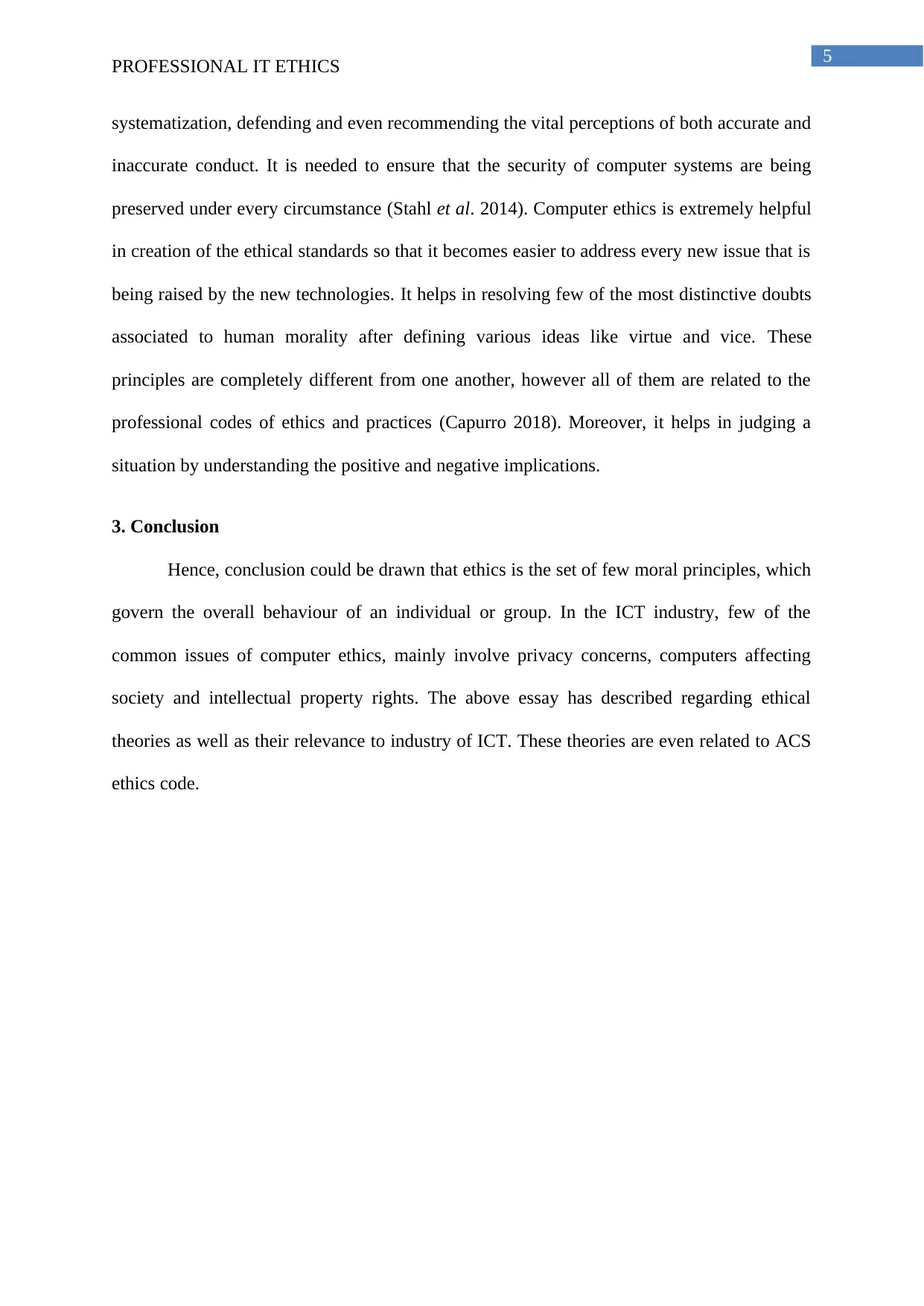
5
PROFESSIONAL IT ETHICS
systematization, defending and even recommending the vital perceptions of both accurate and
inaccurate conduct. It is needed to ensure that the security of computer systems are being
preserved under every circumstance (Stahl et al. 2014). Computer ethics is extremely helpful
in creation of the ethical standards so that it becomes easier to address every new issue that is
being raised by the new technologies. It helps in resolving few of the most distinctive doubts
associated to human morality after defining various ideas like virtue and vice. These
principles are completely different from one another, however all of them are related to the
professional codes of ethics and practices (Capurro 2018). Moreover, it helps in judging a
situation by understanding the positive and negative implications.
3. Conclusion
Hence, conclusion could be drawn that ethics is the set of few moral principles, which
govern the overall behaviour of an individual or group. In the ICT industry, few of the
common issues of computer ethics, mainly involve privacy concerns, computers affecting
society and intellectual property rights. The above essay has described regarding ethical
theories as well as their relevance to industry of ICT. These theories are even related to ACS
ethics code.
PROFESSIONAL IT ETHICS
systematization, defending and even recommending the vital perceptions of both accurate and
inaccurate conduct. It is needed to ensure that the security of computer systems are being
preserved under every circumstance (Stahl et al. 2014). Computer ethics is extremely helpful
in creation of the ethical standards so that it becomes easier to address every new issue that is
being raised by the new technologies. It helps in resolving few of the most distinctive doubts
associated to human morality after defining various ideas like virtue and vice. These
principles are completely different from one another, however all of them are related to the
professional codes of ethics and practices (Capurro 2018). Moreover, it helps in judging a
situation by understanding the positive and negative implications.
3. Conclusion
Hence, conclusion could be drawn that ethics is the set of few moral principles, which
govern the overall behaviour of an individual or group. In the ICT industry, few of the
common issues of computer ethics, mainly involve privacy concerns, computers affecting
society and intellectual property rights. The above essay has described regarding ethical
theories as well as their relevance to industry of ICT. These theories are even related to ACS
ethics code.
⊘ This is a preview!⊘
Do you want full access?
Subscribe today to unlock all pages.

Trusted by 1+ million students worldwide
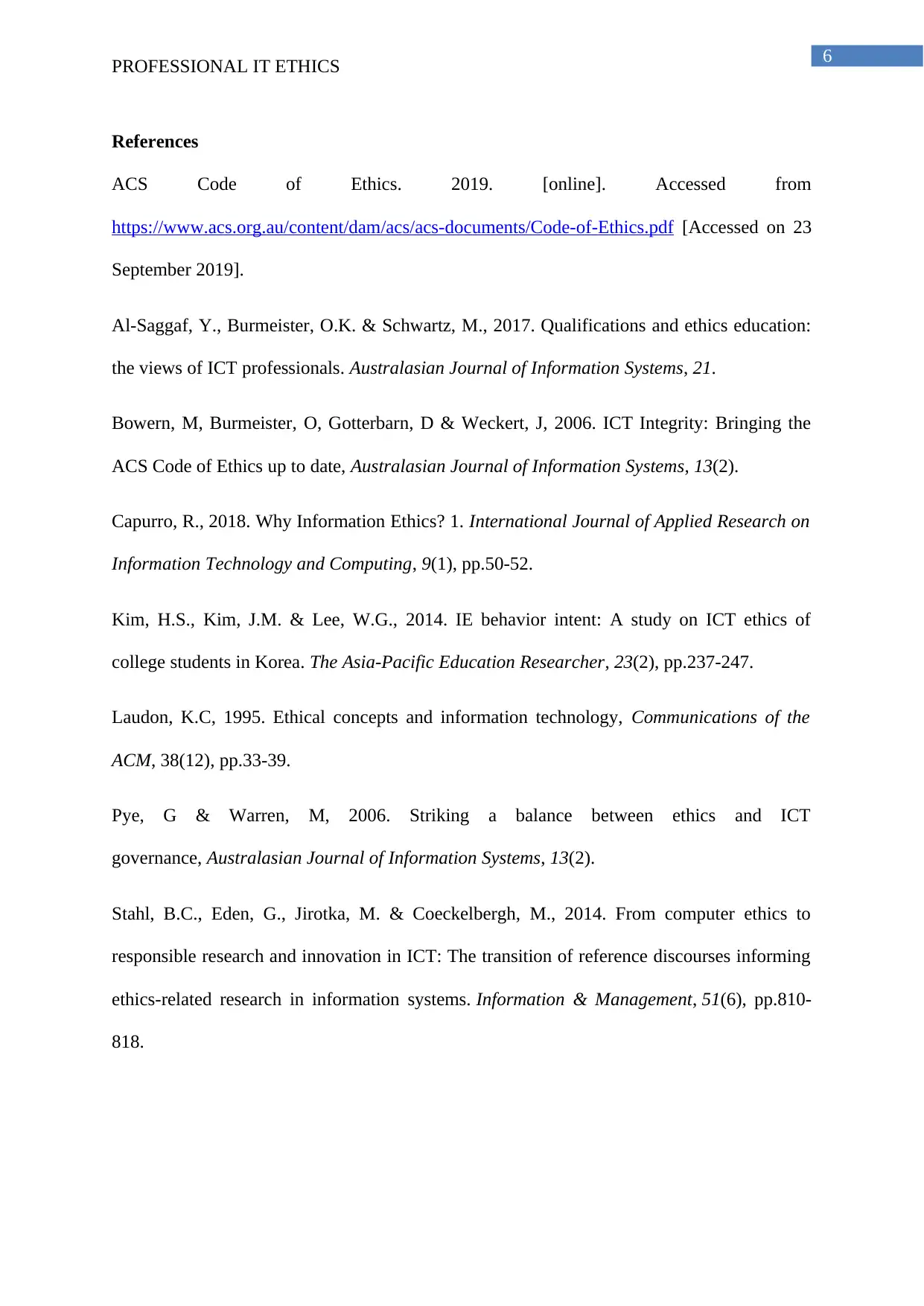
6
PROFESSIONAL IT ETHICS
References
ACS Code of Ethics. 2019. [online]. Accessed from
https://www.acs.org.au/content/dam/acs/acs-documents/Code-of-Ethics.pdf [Accessed on 23
September 2019].
Al-Saggaf, Y., Burmeister, O.K. & Schwartz, M., 2017. Qualifications and ethics education:
the views of ICT professionals. Australasian Journal of Information Systems, 21.
Bowern, M, Burmeister, O, Gotterbarn, D & Weckert, J, 2006. ICT Integrity: Bringing the
ACS Code of Ethics up to date, Australasian Journal of Information Systems, 13(2).
Capurro, R., 2018. Why Information Ethics? 1. International Journal of Applied Research on
Information Technology and Computing, 9(1), pp.50-52.
Kim, H.S., Kim, J.M. & Lee, W.G., 2014. IE behavior intent: A study on ICT ethics of
college students in Korea. The Asia-Pacific Education Researcher, 23(2), pp.237-247.
Laudon, K.C, 1995. Ethical concepts and information technology, Communications of the
ACM, 38(12), pp.33-39.
Pye, G & Warren, M, 2006. Striking a balance between ethics and ICT
governance, Australasian Journal of Information Systems, 13(2).
Stahl, B.C., Eden, G., Jirotka, M. & Coeckelbergh, M., 2014. From computer ethics to
responsible research and innovation in ICT: The transition of reference discourses informing
ethics-related research in information systems. Information & Management, 51(6), pp.810-
818.
PROFESSIONAL IT ETHICS
References
ACS Code of Ethics. 2019. [online]. Accessed from
https://www.acs.org.au/content/dam/acs/acs-documents/Code-of-Ethics.pdf [Accessed on 23
September 2019].
Al-Saggaf, Y., Burmeister, O.K. & Schwartz, M., 2017. Qualifications and ethics education:
the views of ICT professionals. Australasian Journal of Information Systems, 21.
Bowern, M, Burmeister, O, Gotterbarn, D & Weckert, J, 2006. ICT Integrity: Bringing the
ACS Code of Ethics up to date, Australasian Journal of Information Systems, 13(2).
Capurro, R., 2018. Why Information Ethics? 1. International Journal of Applied Research on
Information Technology and Computing, 9(1), pp.50-52.
Kim, H.S., Kim, J.M. & Lee, W.G., 2014. IE behavior intent: A study on ICT ethics of
college students in Korea. The Asia-Pacific Education Researcher, 23(2), pp.237-247.
Laudon, K.C, 1995. Ethical concepts and information technology, Communications of the
ACM, 38(12), pp.33-39.
Pye, G & Warren, M, 2006. Striking a balance between ethics and ICT
governance, Australasian Journal of Information Systems, 13(2).
Stahl, B.C., Eden, G., Jirotka, M. & Coeckelbergh, M., 2014. From computer ethics to
responsible research and innovation in ICT: The transition of reference discourses informing
ethics-related research in information systems. Information & Management, 51(6), pp.810-
818.
1 out of 7
Related Documents
Your All-in-One AI-Powered Toolkit for Academic Success.
+13062052269
info@desklib.com
Available 24*7 on WhatsApp / Email
![[object Object]](/_next/static/media/star-bottom.7253800d.svg)
Unlock your academic potential
Copyright © 2020–2026 A2Z Services. All Rights Reserved. Developed and managed by ZUCOL.




